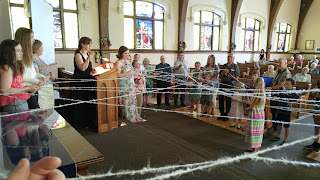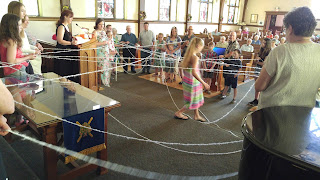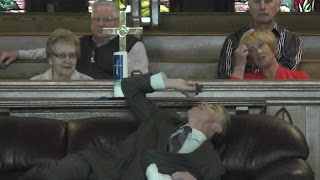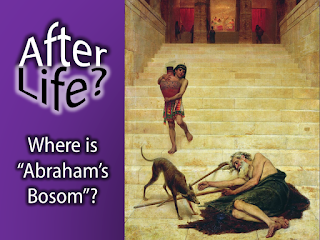Introduction Video:
Hespeler, 18 June 2017 © Scott McAndless – Fathers’ Day
Galatians 5:13-14, Mark 9:33-37, Psalm 138
| A |
s I’m sure we’ve all heard by now, Canada came into being 150 years less two weeks ago and the Dominion of Canada was actually created by an act of the British Parliament. But I don’t think that that was when Canada actually began. I believe that the Canada that I love actually began a few years earlier with a hearty greeting shouted from a rowboat.
Let me explain. You may recall from your high school history classes that the idea of Canada all began with the initiative of a group of people we lovingly call the Fathers of Confederation and a meeting in the City of Charlottetown in Prince Edward Island in the year 1864. They are called the Fathers of Confederation for two reasons. First of all, they were called fathers because they were all men because nobody in the world at that time believed that women had the capacity to make the kinds of deals necessary to create a new country. Yes, people had rather small minds when it came to certain things back then.
But they were also called fathers because they were all engaged in the work that was deemed an essential part of being a father back then – the work of building up the power, wealth and influence of their own families. Take, for example, Father of Confederation Arthur Gordon who was, at that time the Lieutenant Governor of New Brunswick. Historians agree that it was Gordon who really got the whole confederation project rolling. He proposed a meeting of the leaders of the three maritime colonies, Nova Scotia, New Brunswick and Prince Edward Island, to discuss an administrative union.
Now, there were a few reasons why such a union seemed like a good idea at the time. There were economic benefits that might come from a better trade deal with the United States in the post-Civil War era and there were certain political benefits. But honestly, no one was overly excited about the idea. It was with a distinct lack of enthusiasm that the colonies agreed to hold a meeting.
So why was Gordon so keen? Why did he twist so many arms? Well, Arthur Gordon figured that he was in an excellent position to be elected leader of this new union. He was basically pushing the whole project in order to become the most powerful man in the Maritimes. But you can’t blame Gordon. That is what a father is supposed to do – it is all about building up the brand of your own family.
But then something happened. All of a sudden two giants invited themselves to the party that was being planned in Charlottetown: Upper and Lower Canada (or what we know today as Ontario and Quebec). They were economic and political powerhouses that could have easily overwhelmed the little Maritime players. And in fact, that was exactly what they intended to do. They were going to sweep into town, psyche everyone out and basically grab control of this new political entity for their own purposes. Yes, Ontario and Quebec were in it only to gain more for themselves and their families.
The delegation from Upper and Lower Canada (or, “the Canadas” as they were called) knew exactly what to do to make a big impression. They hired the biggest and best steamship that worked on the St. Lawrence River. They would arrive in style and with a show of force. And, of course, now that they knew that the Canadas were coming, the Maritimes suddenly realized that this meeting was much more important than they had thought. They started to scramble for position in their own ways.
That was the setup for the beginning of talks about confederation. Just a whole lot of concern for money and power and what is in it for me and my family. And I realize that there are still people who think that that is what being a country and being a part of a country in this world is about. But what if there is another way?
In his Letter to the Galatians, Paul says something that speaks to me a fair bit about what it means to be a Canadian. “For you were called to freedom, brothers and sisters,” he writes. And that is one of the most valuable things that we are all given as Canadians: freedom. We have the freedom to believe, to think, to speak and pursue our own lives on our own terms. This freedom is at the foundation of just about everything that makes life in our country worthwhile and we must vigilantly stand on guard to make sure that this freedom is not eroded. (Hmm, stand on guard, someone should write a song about that.)
But, though freedom is indeed a wonderful and precious thing, Paul recognized that it came with certain risks. He goes on from there to say, “only do not use your freedom as an opportunity for self-indulgence.” And, in many ways, the story of modern political freedom is the story of exactly that – a story of people taking the freedom that they are given in their nation state and using it in a relentless pursuit of their own self-interest. I don’t think I am saying anything radical here, am I? That is the basic philosophy of neo-liberalism and capitalism. You only need to open up the business section of the newspaper or tune into a business channel to be reminded that we are all supposed to be out there doing whatever the law will allow us to do in order to get as rich as we possibly can. That relentless pursuit of self-interest is, we are promised, is what will make all of us better off.
And, I’ll tell you, I actually do accept that to a certain extent. While I do not think that capitalism is a perfect economic system, I don’t actually think that there is such a thing as a perfect economic system. There is no way to set up a system where all of the resources of a society are fully shared by everyone. And, all things considered, I do think that capitalism might just be the best possible economic system for the world here and now.
But I also think that that relentless self-interested drive that is so essential to capitalism does indeed sometimes lead to terrible abuses and injustices. As Paul puts it, we can end up biting and devouring one another, until we are consumed by one another. It is one of the ever-present possible side effects of unbridled capitalism. It is a real problem that has invaded the histories of many a nation. It is a force that is still at work in our world today.
And I do think that, if you look at the birth pangs of the Canadian Federation that were on display at the Charlottetown conference as the Fathers of Confederation gathered each one pursuing his own self-interest, you can see that they were setting up this country for a long history of biting, devouring and consuming.
But have you heard the story of what happened next? I love this story. The delegation from the Canadas sailed with near regal splendour into the Charlottetown harbour. They pulled up to the wharf and then boarded boats manned by four uniformed oarsmen and a boatswain. Everything was crisp and pressed and marvelous you can be sure. Oh man, were they going to show these Maritimers that they meant business!
Except nobody was watching – nobody was even there. You see, the night before the circus had arrived in Charlottetown and set up just outside of town. Everyone had gone out to see the show.
Well, not quite everyone. The Maritime Fathers of Confederation had left a secretary, William Henry Pope, behind to welcome their guests. The Canadas’ delegation heard a squeak, squeak, squeak and squinted into the sunlight to make out Pope’s little rowboat as he came to meet them. I would have loved to see the looks on their faces as he welcomed them with warm Eastern hospitality, but absolutely no awe at their appearance and no ceremony beyond a hearty, “Welcome, me boys!”
I happen to believe that it was at that instant that the Canada that I most love came into existence because the record seems to indicate that from that moment on, the “Fathers of Confederation” were able to set aside some of the expectations that a patriarchal society (that is, a society organized around and for the benefits of fathers) had heaped upon them. They entered into talks that focussed on how each part of the confederation could be a support to the rest, how the strength of one part could complement the weakness of another and how the support could be repaid in other ways.
I am not suggesting that they created a federation that had no flaws or hidden problems. Of course, there would be growing pains and constitutional wrangling. But they did build a nation where the ideals of mutual support and care were firmly entrenched and there would be an abiding belief that we are all stronger when we stand together despite our differences.
The Apostle Paul writes this to the church in Galatia: “through love become slaves to one another.” And I realize that the image of slavery is not very helpful to most of us. I know of no one who would relish the opportunity to identify as a slave. A more degrading position you could not imagine. But Paul is not speaking of slavery as it is usually conceived here. That is plain because he begins by affirming that we are free. What is more, the slavery he is talking about is created out of love and not out of fear or violence.
No, what Paul is talking about is the fact that true strength for all requires that we not just be interested in our own benefit or position. He is talking about how a truly successful father (or mother, for the gender doesn’t matter) is able to look beyond their own interest and the interest of their tribe and see that we are all stronger when we stand together and we can cherish even the weakest amongst us. “For the whole law is summed up in a single commandment, ‘You shall love your neighbour as yourself.’”
Canada, I believe, is stronger, better and even able to lead the world when it keeps to those simple ideas. I know it is hard sometimes. I realize that, at this very moment, we have our struggles. Alberta, for example, has a very urgent economic need to find a way to get its oil out to the coast. British Columbia has a simultaneous and urgent need to protect its coastal waters from contamination. Quebec has a perennial and I would say a legitimate problem with the constitution and most of the rest of Canada has an understandable fear of even talking about it. There are clashes between small businesses that will struggle to pay a higher minimum wage and the working poor who are already struggling without it.
I don’t pretend for one moment that it will be easy to work all these competing concerns out. But I really don’t fear for the future of our country despite them because the agreement that we must look beyond our own personal needs runs deep in our country. It might even run back to a rowboat in the Charlottetown harbour. Did you know that the citizens of Charlottetown recently installed a sculpture of William Henry Pope and his rowboat. I look forward to the day that they put that sculpture on a stamp, it is a great symbol of our nation.
What are the applications of all of this to our nation today, to our own individual lives and to our churches? I think there are many. The temptation to look out only for our own interest, for what we want or need, will always be there. It is human and we are only human. But the power that comes when we learn to look past that is great. It can transform the world and our personal lives. It was always intended to transform the church. Just to counter the persistent message of our world that you must only think of yourself and your family can be a great start to building a better nation and a better world for all. This too is the good news of the Christian gospel.
#140CharacterSermon #Canada began with a welcome from a rowboat. This teaches us about looking beyond our own personal needs. #Canada150
















